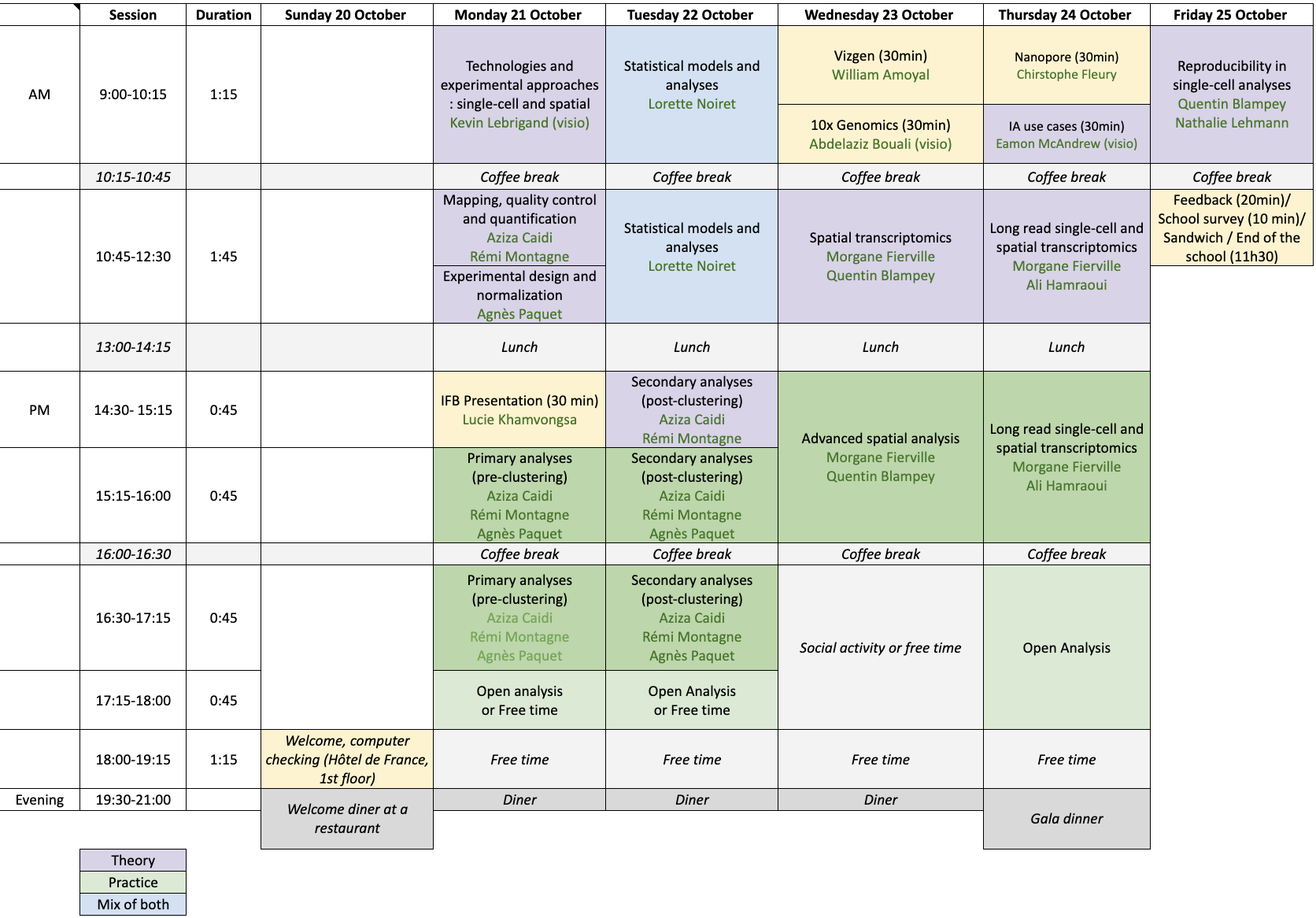Résumé de section
-
This 5 days workshop will take place in the Station Biologique de Roscoff, in the French Finistère (29680). Please note that the school starts on a Sunday evening, and ends on the following Friday at noon. You can check the program below for further informations.
Dates
From Sunday 20th of October to Friday 25th of October 2024
Location
Station Biologique de Roscoff (CNRS - Sorbonne Université)
To get details on how to get there, please visit this dedicated page : https://www.sb-roscoff.fr/fr/station-biologique-de-roscoff/services/venir-a-la-sbrBy train: TGV Paris Montparnasse and Morlaix (duration 3 hours) then bus from Morlaix to Roscoff (duration 32 minutes)
By plane: flights from Roissy and Orly to Brest, then taxi from Brest to Roscoff.
If you can share the taxi with others, the price is interesting. We can provide you with detailed information on taxi companies with collaboration from the center of Roscoff. A shared document will be put in place to allow participants wishing to get in touch with people traveling on the same train / plane.Language
All the classes will be taught in English
-
How to apply for the school ?
Please submit your application here : https://sincellte-workshop.pasteur.cloud/
Registration fees
The registration fee includes accommodation and meals, from Sunday dinner up to Friday lunch.
The organization of your trip and the payment of your transport costs are at your expense.- Academics / University : 850 €
- Personnel de plateformes membres IFB : 550 €
- Non-academics : 1750 €
DeadlineThe deadline to submit your application is the 7th May 2024 (participants selection will happen the 30th May 2024). As the number of participants is limited (30 participants), the steering committee will retain candidates on the basis of the information inquired on the registration form.
- Academics / University : 850 €
-
Scientific coordination
- Marc Deloger (Gustave Roussy)
Dr. Marc Deloger is Head of Bioinformatics Core Facility of Gustave Roussy Hospital. He has expertise in analysis of many different types of NGS data but mainly in RNA-seq (bulk, single-cell and long reads) and WES. He is part of the BioInformatics French Society (SFBI) council. - Marie-Agnès Dillies (Institut Pasteur, IFB Pasteur Hub)
Dr. Marie-Agnès Dillies is head of the Bioinformatics and Biostatistics Hub of the Institut Pasteur. She has expertise in statistical analysis of gene expression data (Dillies et al, Briefings in Bioinformatics 2013). She is co-animating the StatOmique group. - Kevin Lebrigand (CoBiODA, IPMC CNRS, Sophia Antipolis)
Dr. Kevin Lebrigand is Head of CoBiODA Bioinformatics Core Facility of Institute of Molecular and Cellular Pharmacology. He has a wide expertise in genomics focusing his research methodological developments around single-cell and spatial long-read approaches. - Nathalie Lehmann (Institut Pasteur, IFB Pasteur Hub)
Dr. Nathalie Lehmann is a research engineer in Bioinformatics. She recently joined the Hub of Bioinformatics and Biostatistics of the Institut Pasteur. She is an expert in single-cell transcriptomics (short-read and long-read Nanopore). - Agnès Paquet (Syneos Health, Sophia Antipolis)
Agnes Paquet is an expert in statistical analysis and mining of large datasets from high-throughput assays, including NGS data (bulk and single cell). She is specialized in biomarkers discovery and in development and validation of assays for diagnostic and resistance assessment (HIV and breast cancer) and regulatory bioanalysis. - Nicolas Servant (Institut Curie, INSERM U900, Mines ParisTech, IFB Curie bioinfo)
Dr. Nicolas Servant is co-Director of Bioinformatics core facility at Institut Curie, Paris. He has a wide expertise in NGS, including epigenomics, in particular 3D conformation of the chromatin. He recently joined the Institut Curie single-cell initiative. - Morgane Thomas-Chollier (ENS-PSL, IFB-core UAR 3601)
Dr. Morgane Thomas-Chollier is Associate Professor in Bioinformatics at Ecole Normale Supérieure Paris, head of the ENS Genomics platform and adjunct director of Institut Français de Bioinformatique. She has expertise in single-cell transcriptomics (short read and long-read Nanopore), bulk epigenomics and motif analysis in genomic sequences.
Pedagogical team- Quentin Blampey (Université Paris-Saclay)
- Aziza Caidi (Gustave Roussy)
- Morgane Fierville (CoBiODA, IPMC CNRS, Sophia Antipolis)
- Ali Hamraoui (ENS-PSL)
- Kevin Lebrigand (CoBiODA, IPMC CNRS, Sophia Antipolis)
- Nathalie Lehmann (Institut Pasteur, IFB Pasteur Hub)
- Eamon McAndrew (CoBiODA, IPMC CNRS, Sophia Antipolis)
- Rémi Montagne (Institut Curie, INSERM U900, IFB Curie bioinfo)
- Lorette Noiret (Institut Curie)
- Agnès Paquet (Syneos Health, Sophia Antipolis)
Technical coordination- Erwan Corre (IFB ABIMS FR2424 CNRS-UPMC, Station Biologique de Roscoff)
Dr. Erwan Corre is Head of Bioinformatics Core Facility of Roscoff Marine Station (ABiMS - NNCR IFB Platform) providing the computing infrastructure for the training. As a bio‐analyst, he has expertise in: assembly, curation and annotation of (meta-) transcriptomics and (meta-) genomic sequences on non-model organisms and environmental samples. He is part of the BioInformatics French Society (SFBI) council.
Administrative management- Olivier Sand & Lucie Khamvongsa-Charbonnier Institut Français de Bioinformatique (IFB)
- Marc Deloger (Gustave Roussy)
-
This is the provisional program of the workshop. It may be subject to modification.

-
How to apply for the school ?
Please submit your application here : https://sincellte-workshop.pasteur.cloud/
Will teaching materials be available after the worshop for those you cannot participate ?
Generally, for this type of school, we ask speakers to produce a version that can be published on the website (i.e. with all sources clearly indicated, confidential or as yet unpublished results removed, etc.). Documents are uploaded to the IFB's Moodle platform as they become available.
How do I know if I am elegible for the academics registration fee ?It all depends on your official "employer" and not on the laboratory / institute to which you are attached. The academic rate applies to staff financed by a public institution, i.e. with a pay slip from an EPST (CNRS, IFSTTAR, INED, INRA, INRIA, INSERM, IRD, IRSTEA) or a university.
